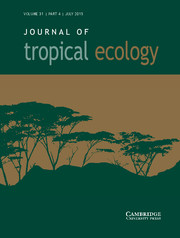Crossref Citations
This article has been cited by the following publications. This list is generated based on data provided by
Crossref.
Azevedo, Ricardo B. R.
French, Vernon
and
Partridge, Linda
1997.
Life‐History Consequences of Egg Size inDrosophila Melanogaster.
The American Naturalist,
Vol. 150,
Issue. 2,
p.
250.
Guerrero, Sandra M.
Calderón, Martha L.
de Pérez, Gloria R.
and
Ramírez‐Pinilla, M. Patricia
2003.
Annual reproductive activity of Caiman crocodilus fuscus in captivity.
Zoo Biology,
Vol. 22,
Issue. 2,
p.
121.
Villamarín, Francisco
Marioni, Boris
Thorbjarnarson, John B.
Nelson, Bruce W.
Botero-Arias, Robinson
and
Magnusson, William E.
2011.
Conservation and management implications of nest-site selection of the sympatric crocodilians Melanosuchus niger and Caiman crocodilus in Central Amazonia, Brazil.
Biological Conservation,
Vol. 144,
Issue. 2,
p.
913.
Alho, Cleber J. R.
and
Silva, João S. V.
2012.
Effects of Severe Floods and Droughts on Wildlife of the Pantanal Wetland (Brazil)—A Review.
Animals,
Vol. 2,
Issue. 4,
p.
591.
Pereira, A.C.
and
Malvasio, A.
2014.
Síntese das Características da Ordem Crocodylia, Fatores de Influência em Estudos Populacionais e Aspectos de Seleção e uso de Habitat para Caiman crocodilus e Melanosuchus nigerno Estado do Tocantins, Brasil.
Biota Amazônia,
Vol. 4,
Issue. 1,
p.
111.
Campos, Zilca
Mourão, Guilherme
Coutinho, Marcos
Magnusson, William E.
and
Rogers, Sean
2014.
Growth of Caiman crocodilus yacare in the Brazilian Pantanal.
PLoS ONE,
Vol. 9,
Issue. 2,
p.
e89363.
Green, Timothy W.
Slone, Daniel H.
Swain, Eric D.
Cherkiss, Michael S.
Lohmann, Melinda
Mazzotti, Frank J.
and
Rice, Kenneth G.
2014.
Evaluating Effects of Everglades Restoration on American Crocodile Populations in South Florida Using a Spatially-Explicit, Stage-Based Population Model.
Wetlands,
Vol. 34,
Issue. S1,
p.
213.
de Souza, Julio Cesar
da Cunha, Vanessa Pereira
and
Markwith, Scott H.
2015.
Spatiotemporal variation in human-wildlife conflicts along highway BR-262 in the Brazilian Pantanal.
Wetlands Ecology and Management,
Vol. 23,
Issue. 2,
p.
227.
Campos, Zilca
Sanaiotti, Tânia
Marques, Vanílio
and
Magnusson, William E.
2015.
Geographic Variation in Clutch Size and Reproductive Season of the Dwarf Caiman,Paleosuchus palpebrosus,in Brazil.
Journal of Herpetology,
Vol. 49,
Issue. 1,
p.
95.
Hekkala, Evon R.
Platt, Steven G.
Thorbjarnarson, John B.
Rainwater, Thomas R.
Tessler, Michael
Cunningham, Seth W.
Twomey, Christopher
and
Amato, George
2015.
Integrating molecular, phenotypic and environmental data to elucidate patterns of crocodile hybridization in Belize.
Royal Society Open Science,
Vol. 2,
Issue. 9,
p.
150409.
Campos, Zilca
Mourão, Guilherme
Coutinho, Marcos
Magnusson, William E.
Soriano, Balbina M. A.
and
Janke, Axel
2015.
Spatial and Temporal Variation in Reproduction of a Generalist Crocodilian, Caiman crocodilus yacare, in a Seasonally Flooded Wetland.
PLOS ONE,
Vol. 10,
Issue. 6,
p.
e0129368.
Campos, Z.
and
Mourão, G.
2015.
Camera traps capture images of predators ofCaiman crocodilus yacareeggs (Reptilia: Crocodylia) in Brazil’s Pantanal wetlands.
Journal of Natural History,
Vol. 49,
Issue. 15-16,
p.
977.
Markwith, Scott H.
Evans, Aaron H.
Pereira da Cunha, Vanessa
and
de Souza, Julio Cesar
2020.
Scale, rank and model selection in evaluations of land cover influence on wildlife–vehicle collisions.
Wildlife Research,
Vol. 47,
Issue. 1,
p.
44.
Somaweera, Ruchira
Nifong, James
Rosenblatt, Adam
Brien, Mathew L.
Combrink, Xander
Elsey, Ruth M.
Grigg, Gordon
Magnusson, William E.
Mazzotti, Frank J.
Pearcy, Ashley
Platt, Steven G.
Shirley, Matthew H.
Tellez, Marisa
van der Ploeg, Jan
Webb, Grahame
Whitaker, Rom
and
Webber, Bruce L.
2020.
The ecological importance of crocodylians: towards evidence‐based justification for their conservation.
Biological Reviews,
Vol. 95,
Issue. 4,
p.
936.
2022.
Reproductive Biology of the Crocodylia.
p.
121.
Thévenet, Julie
Papet, Léo
Campos, Zilca
Greenfield, Michael
Boyer, Nicolas
Grimault, Nicolas
and
Mathevon, Nicolas
2022.
Spatial release from masking in crocodilians.
Communications Biology,
Vol. 5,
Issue. 1,


